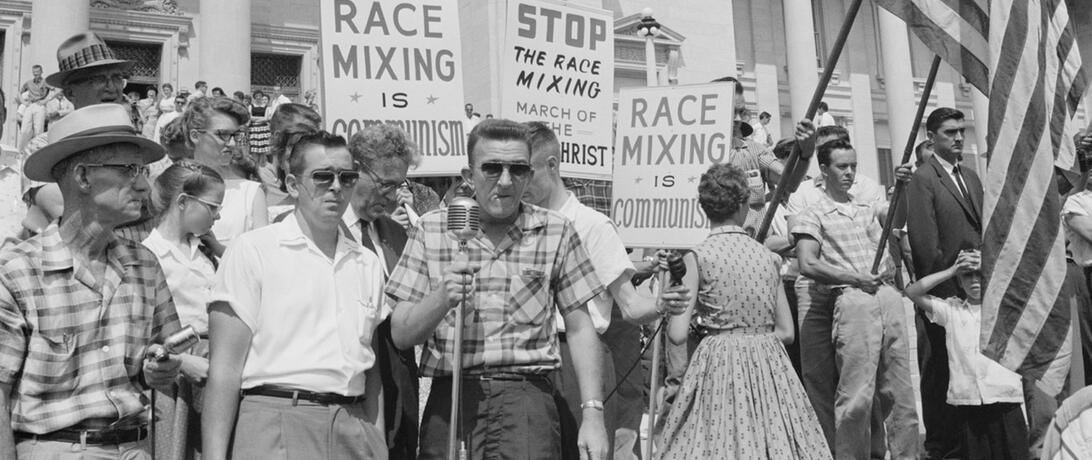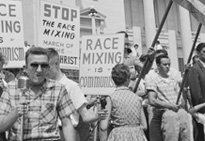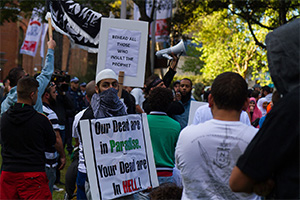
The study of individual beliefs and belief systems may have the potential to provide valuable insights into the drivers of many conflicts. But conflict prevention that is not systematic, self-critical and acknowledging of all of the other elements that may spawn conflict, has the potential to devolve into a demonization of belief systems.
 In his video post (see right), Dr. Collier asserts that the causes of conflict are partly due to objective circumstances and partly to dysfunctional beliefs. Conflict is a broad category of human interactions, so for this purpose let’s narrow it to war, and specifically civil war. Political scientists and economists have led numerous analytical endeavors to understand civil war as a general phenomenon, focusing largely on those causes that Dr. Collier identifies as objective (e.g. economic development, constitution building, etc…).
In his video post (see right), Dr. Collier asserts that the causes of conflict are partly due to objective circumstances and partly to dysfunctional beliefs. Conflict is a broad category of human interactions, so for this purpose let’s narrow it to war, and specifically civil war. Political scientists and economists have led numerous analytical endeavors to understand civil war as a general phenomenon, focusing largely on those causes that Dr. Collier identifies as objective (e.g. economic development, constitution building, etc…).
Why this focus? We suspect there are several reasons. The first, and perhaps most compelling, is that objective reasons are easier to measure, at least with most analytical techniques. We have more direct indicators of how a country’s economy is doing, for instance, than how excluded a particular minority group feels or how much hostility group members perceive from neighboring communities. This means that it is easier for researchers to study objective factors and that it is more difficult for researchers who do attempt to quantify dysfunctional beliefs to convince people of their findings.
Recently, however, there has been resurgence in efforts to better understand how more subjective factors, like beliefs, correlate with conflict. As Dr. Collier says in his video, researchers’ challenge today is to figure out how to “break” belief systems that might perpetuate conflict. To effectively engage beliefs and their role in the use of violent tactics, researchers must address some fundamental issues. To that end, and in no particular order, here are a few outstanding questions we are excited to learn more about:
 1. Which beliefs matter when we’re talking about these correlations? Do we mean a belief paradigm, like those consistent with many religions? Or do we mean beliefs related to a group’s (or individual’s) relative welfare, such as humiliation or worthlessness? Or do we mean beliefs which relate to how individuals and societies view those outside of their particular in-group, such as nationalism or racism?
1. Which beliefs matter when we’re talking about these correlations? Do we mean a belief paradigm, like those consistent with many religions? Or do we mean beliefs related to a group’s (or individual’s) relative welfare, such as humiliation or worthlessness? Or do we mean beliefs which relate to how individuals and societies view those outside of their particular in-group, such as nationalism or racism?
2. Can beliefs be causally connected to conflict? Some people think so (Huntington 1993, Triandis 2000, Harris 2006). Some data, however, indicate the story is much more complex. In his analysis, Victoroff concluds that, “Terrorist behavior is probably always determined by a combination of innate factors, biological factors, early developmental factors, cognitive factors, temperament, environmental influences, and group dynamics,” (Victoroff 2005, p. 34). Arguments from psychology (e.g. Wilson and Bar-Anan 2008) suggest that what beliefs people indicate as motivating are often not the real causes of their actions. They argue the actions of individuals who collectively constitute societies in conflict are the result of myriad motivations, many of which are subconscious in nature. As such the moral or ideational reasons individuals give to justify their actions are largely a means of providing post hoc meaning to actions which were in reality the result of a plethora of motivations having very little to do with individual or societal beliefs. How should research contend with these opposing views?
3. Whose beliefs matter in these correlations? Civil war and most forms of political conflict involve antagonists that are defined by membership in some group. For instance: Tutsis versus Hutus or Catholics versus Protestants. Should we focus on the group’s collective beliefs, those of individual members, or perhaps only those of the group’s most extreme factions?
 4. Assuming we have a sense of which beliefs matter and at what level to look for them, can we measure them? Sophisticated survey techniques are getting better at this (Fair, Malhotra, and Shapiro 2013) ….are they good enough? (The answer to the latter question is probably never; so perhaps we ought to ask if they are acceptable enough to inform public policy.)
4. Assuming we have a sense of which beliefs matter and at what level to look for them, can we measure them? Sophisticated survey techniques are getting better at this (Fair, Malhotra, and Shapiro 2013) ….are they good enough? (The answer to the latter question is probably never; so perhaps we ought to ask if they are acceptable enough to inform public policy.)
5. If we take seriously the idea that beliefs are simply necessary but not sufficient for conflict, why are they sometimes “activated” and other times not? What specific elements of beliefs led to an escalation of antagonism and intergroup tension and then to actual conflict? Are certain material conditions necessary in order for this escalation to occur?
6. What roles do group leadership, governance, and institutions play? Across the globe we see societies with outwardly very similar belief systems but that experience very different levels of conflict. In many cases, it appears that the strength of a state’s institutions, public service and security provision are the main factors which lead to differing levels of conflict in societies with very similar belief systems. For example, Wahhabism has become an influential belief system in both Afghanistan and Saudi Arabia. However, while Afghanistan, with its weak state and minimal provision of public services, has deteriorated into decades of civil war and violence, much of it in the name of religion, Saudi Arabia, with its stronger institutions, security and public services has avoided any such high intensity internal conflict.
7. Finally, if we except the premise that “dysfunctional” beliefs drive conflict and that we must then ‘break’ the social networks which espouse these beliefs to ensure peace, how do we do so without further exacerbating the conflict which we seek to avoid?
 The study of individual beliefs and belief systems may have the potential to provide valuable insights into the drivers of many conflicts. Certainly ideological trends which encourage the exclusive development of in and out group identities and promote violence as a tool to resolve inter-group disputes would be a cause of concern for those seeking to promote peace. However, any approach to the study of conflict that focuses on the identification and counteraction of “dysfunctional” beliefs needs to provide a systematic accounting of the questions above. Conflict prevention that is not systematic, self-critical and acknowledging of all of the other elements that may spawn conflict has the potential to devolve into a demonization of belief systems, which, in reality, have no causal effect on the likelihood of conflict.
The study of individual beliefs and belief systems may have the potential to provide valuable insights into the drivers of many conflicts. Certainly ideological trends which encourage the exclusive development of in and out group identities and promote violence as a tool to resolve inter-group disputes would be a cause of concern for those seeking to promote peace. However, any approach to the study of conflict that focuses on the identification and counteraction of “dysfunctional” beliefs needs to provide a systematic accounting of the questions above. Conflict prevention that is not systematic, self-critical and acknowledging of all of the other elements that may spawn conflict has the potential to devolve into a demonization of belief systems, which, in reality, have no causal effect on the likelihood of conflict.
Finally, the study of how beliefs influence conflict should supplement, not replace the study of the material conditions that lead to violence. Too often we turn to explanations of conflict driven by our perceptions of belief systems rather than the objective realities of individuals and societies in conflict. Examples abound of civil wars and other intrastate conflicts that take on an ideational, cultural or religious component, but which are originally catalyzed by the structure of institutions, socioeconomic inequality, access to weapons, competition over resources or other objective conditions. As mentioned above, these objective conditions are easily measured and analyzed. When we step into the realm of studying the inner thoughts and motivations of individuals and societies we can draw far less concrete conclusions.
Article Details
Published
Written by
Topic
Program
Content Type
Opinion & Insights